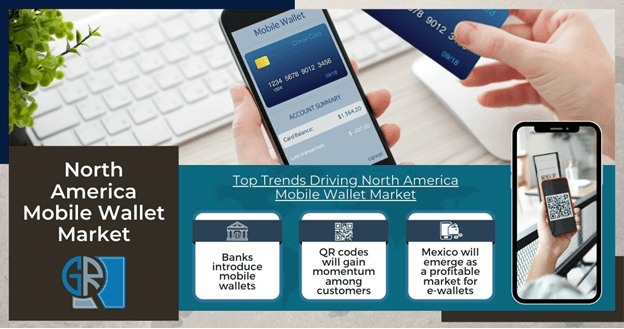The growing digitization of payment processes will positively affect North America mobile wallet market forecast. The region is home to some of the most reputed technology companies that are focused on enhancing customer experience and satisfaction. They are launching several mobile wallet services to make digital transactions easier, more convenient, secure, and faster.
For example, in October 2021, Facebook launched its own digital wallet Novi in the U.S., a rebranded version of the Calibra wallet earlier launched by the social media giant. With the help of this app, customers can transfer money between wallets for free.
Since the region’s banking sector is implementing a wide range of innovative digital technologies, governments are supporting this mass transition by introducing various initiatives and schemes. For instance, in November 2021, the Government of Canada introduced the Digital Identity Program to enable easier access to online services like banking and retail.
Customers can use their digital IDs to open bank accounts and carry out contactless transactions. The solution can be easily stored in digital wallets so that authorities can verify the customer's details before giving them access to confidential financial information.

Banks introduce mobile wallets:
Banks and financial institutions across North America are witnessing a favorable impact of mobile wallets on their revenue margins. They are gradually understanding the importance and benefits of introducing digital payment options that will help them expand their customer base.
Reputed banks, such as JP Morgan Chase & Co, Bank of America, and Wells Fargo have launched their e-wallets to create ease in carrying out various financial transactions without worrying about data security breaches or cyberattacks.
QR codes will gain momentum among customers:
North America mobile wallet market size from QR codes will record a notable growth rate through 2026. This technology is being widely used by customers because it is easier and faster to scan the code and make payment, increasing customer convenience.
According to some surveys, the U.S. has witnessed a steady increase in QR code payments since the start of the COVID-19 pandemic in 2020. One of the major reasons for this is the growing demand for contactless payments due to the rising infection rate across the country.
Customers feel safer and more confident while using the QR code technology because it only links the payment app with their bank accounts. Since the app encrypts the confidential data entered by the client, they can make payments without worrying about sharing personal information.
Mexico will emerge as a profitable market for e-wallets:
Mexico mobile wallet market value will increase at a steady rate because more people are opting for contactless payment systems. According to some reports, a large percentage of Mexicans use mobile banking apps and virtual banking solutions, showing the rising popularity of online transactions.
Customers across the country mainly use the digital payment services such as Conekta. While majority of the population in Mexico still prefers cash for all its banking activities, there is immense scope for e-wallets to grow.
North America mobile wallet market share will be driven by the rising use of digital technologies in the region’s banking industry. Organizations, such as First Data Corporation, Due Inc., AT&T Inc., American Express Company, Amazon.com, Inc., Apple Inc., PayPal Holdings, Inc., and Wells Fargo & Company, among many others, are some of the top virtual wallet solution providers in North America.
These companies use vital strategies like partnerships, mergers, and acquisitions to strengthen their business capabilities. For instance, U.S. pay tech firm Rev partnered with Brazil-based Banco Itau to develop and launch a multi-currency digital wallet for its international private banking clients.


